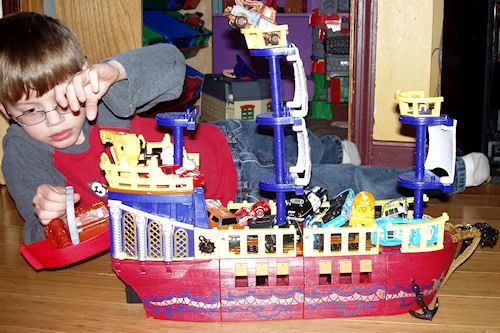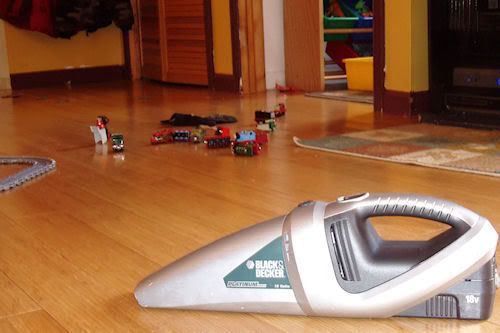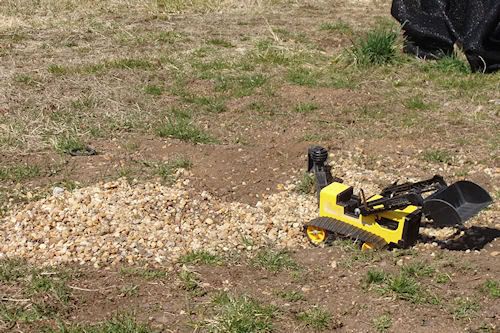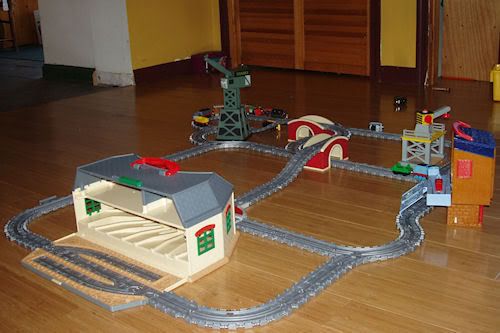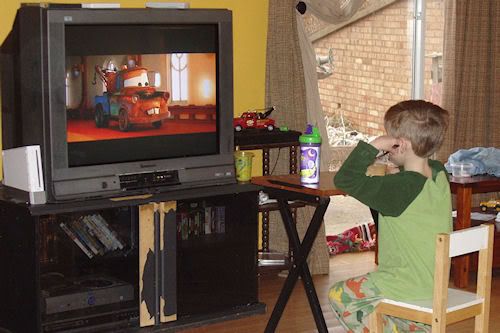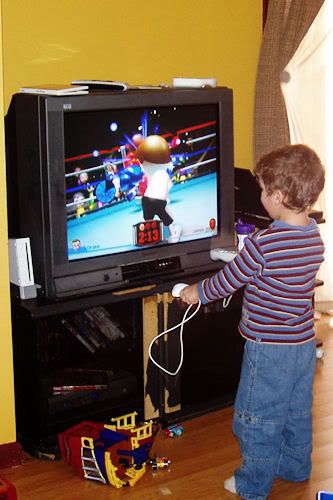And that is all it was too, not a career, just a job & that was all I wanted, so it never bothered me at the time.
Have you seen the show Secret Life of a Soccer Mom? They take SAHMs who gave up a career when the kids were born, give them back that career for a week & then usually offer them that job at the end of the week. I haven't seen all the episodes so I can't say for sure that they always do it, but they have for every one I have seen. This has been a hot topic at playgroup. Would you go back to your career? I never say anything because I don't have a career to go back to. Other mom's in the group had careers. They were in Social Services, Broadcast Journalism, Nursing, Teaching, Underwriting, Law - specialized things you study for & then spend 30 or so years doing.
I, on the other hand, had a job. Lots of jobs actually. I have 2 degrees. A BS in Journalism and an MA in Early Modern History. I could have a had a career with those, but I didn't particularly want to. I wanted an office job. A nice, Monday to Friday, 9-5, paper shuffler sort of job. A job that gets left at the office at the end of the day. The kind that offers 2 weeks paid vacation, insurance & a 401k plan. The subject of the papers I would shuffle didn't not matter. I have interests & hobbies that don't pay well, so I wanted something to fund me in a regular & predictable way, so I could get on with doing what I enjoy.
The only thing I could be said to make a career of would be 'being one of the last people laid off', which is a useful skill if you seem to gravitate toward booming industries that then collapse 2 year later. I worked in the mortgage industry in the early/mid-90s and the telecom industry in the late 90's. I've held 5 'professional' jobs since college and been laid off 3 times. Each time I was in the last round of layoffs, kept around to clean up the mess made from laying most everyone else off and arrange the details for packing up what is left. This is due to my 3 most marketable skills - general knowledge of administrative duties & details, willingness to learn parts of everyone's job, and fearlessness in the face of new technology. Being 'good with computers' got me all 5 of my jobs, though nowadays it's not worth squat.
I suppose with my history the show could send me to work for a company that bought a lot of subprime loans & is now about to fold or be bought out. I have worked in the industry before. I started out with a mortgage company in 1992 during a refi boom. I was laid off in early 1995 when it ended. While I was there my fearlessness in the face of new technology caused me to drift into a sort of on site IT person. If there was a problem with the terminals or the computers or the network, I was called. If I couldn't deal with it, I called the main office. I also did a lot of data entry stuff for everyone. So when they laid off half the staff they kept me - low pay & lots of skills puts you high on the 'keep' list. Eventually they closed the office & gave me the boot too but I had 2 months notice it was coming & had time to plan.
I took my talent for figuring out any data entry program & small knowledge of networks to a local long distance company, where used both in the same sort of general administrative & help desk sort of position. I knew enough to be useful to a lot of people & paid decently. I learned about LECs, and WISPs, and T-1s and SMS/800 and Lucent switches. When the local long distance business was bought out by the big guys I was kept on long enough to convert everything and again had about 2 months warning of my official redundancy notice. Then I moved to a company that sold space on their switch to companies who resold the minutes to international calling card companies. Once again my administrative, data entry & fearlessness in the face of new technology kept me employed. I learned about programing switches, because having an uncertified switch tech full time while the certified guy is only 'on call' is a lot cheaper than paying the certified guy full time. About the time I was actually going to get my certification (company paid) it ran into financial problems, all training was put off and the layoffs began. I went last, working for 4 months completely alone in the office, with very little to do. I was paid very well to chat on email lists with friends & surf the web & basically be a body there in case something happened.
I took these new skills to a catalog call center, where I again ended up mixing administrative duties, a talent for figuring out software easily and my telecom knowledge into a well-paid and vaguely defined position that's duties shifted around, but I held for 4 years, until Havoc was born. It was a great job - Mon-Fri, 9-5, all the benefits, plus it was hourly so I made some kick ass overtime pay from Oct-Feb. It changed enough to remain interesting and challenging, with bits & pieces from various parts of the call center - budgeting, scheduling, telecom, monitoring. But in the end, it was just a job. Lack of certification or education in any technical field would keep me from making a career of it and I really didn't want to. Then i would have had to work shift work, take work home with me, have real responsibilities, and no overtime. Judging by my co-workers later experiences, I would have been laid off due to redundancy about 18 months after Havoc was born. Though again, I would have been kept around after the initial layoffs, being once more put in the position of making myself redundant and would have had 2-3 months notice of my eventual dismissal.
I'm not sure what I would have done at that point, which skills I would have chosen to focus on next. Given the job market at that time, I suspect I would have take my knowledge of various scheduling & monitoring software to another call center or IT department. At this point my knowledge is too out of date to give me an edge on the competition. While I have been watching Noggin and setting up track for Thomas over the past 5 years, technology has moved on & I have not.
I would not be shedding tears of joy at being able to spend a week scheduling a bunch of people for phone shifts or going to meetings about projections for the coming year or tracking down a wiring problem in the network.
That is how I know I had a job, and not a career.
